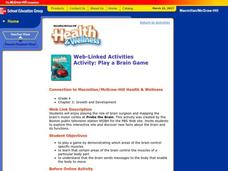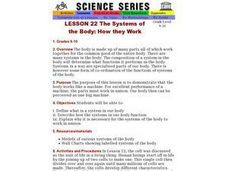Curated OER
Remember This?
Students investigate the mechanics of an fMRI and the properties of neurons. In this biology lesson, students analyze the way the brain works by performing tests in the neurons in the brain. This is all done theoretically.
Curated OER
What Are the Advantages and Disadvantages of Conforming?
Dive into Arthur Miller’s The Crucible and determine what it means to conform in society, and discuss as a group with the thoughts and plans available in these documents. Included are multiple activities and brain targets that form the...
Science Teachers
Organ Systems Crossword Puzzle
An attractive and informative body systems crossword plus its answer key is provided for your life science learners. The topic is the organs. With 23 prompts to address, they are sure to get a complete review in identifying the systems...
Biology Junction
Annelids: The Segmented Worms
Here's a lesson that just might make your class squirm! Learn about segmented worms in a detailed PowerPoint presentation including the wriggly earthworms young scientists dig up in their backyards. Although seemingly simple creatures,...
Gallantsbiocorner.com
The Cell
Help young biologists piece together an understanding of cell structure with a comprehensive review worksheet. Tasking students with describing the function of the organelles found in cells and their relationship with one another,...
Early Childhood Learning and Knowlege Center
My Body My Senses
In a comprehensive unit of activities, learners explore the five senses. Youngsters discover the many different body parts and their functions that allow humans to have sense of sight, touch, smell, taste, and hearing. The best way to...
Curated OER
Digging Deep for Figurative Language (Hyperbole)
What are hyperboles? Examine the attributes of hyperboles with your high school classes. Pupils read selected poems and prose selections that feature hyperboles and discuss their functions in each work of literature. Specific poems and...
Curated OER
HS 204: Introduction to Literature: Poetry Section
This outline introduction for a college course covers the idea of humanities and various language forms and literature genres. Beginning with the human species and our influence on the world around us, take a very thorough look at the...
Curated OER
Phineas Gage: Questioning Strategy
Focus on chapter two of Phineas Gage: A Gruesome but True Story About Brain Science with a questioning activity. After teaching and modeling several types of questions, learners work with partners and then independently to answer and...
Exploratorium
Seeing Your Blind Spot
Viewers use a small, dimmed flashlight to identify the blind spot for both the right and left eye. It is a simple activity to incorporate into your activities during a lesson on vision and the structure and function of the eyeball.
American Museum of Natural History
Fighting Dinos
A famous fossil of fighting dinosaurs holds as many questions as answers. Scholars first analyze the fossil itself by virtually highlighting the specific bones of the dinosaurs and read about their function and importance. They then test...
Green Education Foundation
How Loud is Too Loud?
Ever wonder how loud a sound has to be to cause damage? Young scientists explore sound properties by researching decibel levels. They discuss how sound is perceived by our ears and our brains and why it can cause negative health effects...
Curated OER
Bite on This!
Different types of teeth have different roles. Third graders study how molars, incisors, and canines function in a rabbit skull and a cat skull. After answering some questions about the teeth of herbivores and carnivores, kids...
Curated OER
Growth and Development
Fourth graders explore an interactive site and discover new facts about the brain and its functions. They play a game demonstrating which areas of the brain control specific muscles.
Curated OER
The Nervous System
In this nervous system worksheet, students review the structure and function of the central nervous system. This worksheet has 1 drawing and 17 fill in the blank statements.
Curated OER
Teen and Decision Making
Students examine how the brain develops. In this neurology lesson students read an article citing evidence that the different areas of the brain mature at different rates. They discuss emotional versus logical aspects of decision-making....
Curated OER
It's All in Your Mind
Pupils investigate the definition of memory. In this memory lesson students investigate strategies to improve memory as well as examine what the difference is between a short-term memory and a long-term memory.
Curated OER
Healthy Eyes and Low Vision Care
Students explain how eyes function, how to prevent eye problems, the types of refractive errors, and the common low vision and eye disease problems. They receive professional development points upon successful completion of an assessment.
Curated OER
The Systems of the Body: How they Work
Young scholars study what a body system is, how they function and how the systems work in unison.
Curated OER
Sense Organs & Body Systems: Cool Facts & Trivia
In this sense organs and body functions activity, students answer true and false questions about sense organs and body functions. Students complete 13 questions.
Curated OER
Knowing Your Computer
In this computers instructional activity, students examine the eight parts of a computer and ask for adult help to define the functions of each piece of hardware.
Curated OER
Mapping the Homunculus
Students determine the relative number of nerve endings located in the skin. By calculating the reciprocal of these measurements, students have the appropriate data for predicting the relative size of the homunculus found on the cerebral...
Curated OER
The Laughing Brain 1: How We Laugh
Students to rate themselves on a scale from 1 to 10 (10 being the happiest) as to how happy they feel and write their rating on a sheet of paper. They explore gelotology (the science of laughter) and its benefits to our social, mental,...
PBS
Stories of Painkiller Addiction: Contemplating Nature vs. Nurture
Does having an addict in your family make it more likely to become one yourself? Explore the genetic risk factors, as well as the prominent environmental influences, for substance addiction in a lesson that encourages awareness and open...
Other popular searches
- Functions of the Brain
- Biology Brain Functions
- Psychology Brain Functions
- Stimulate Brain Functions
- Estimulate Brain Functions
- Defining Brain Functions
- Functions of Brain Science























